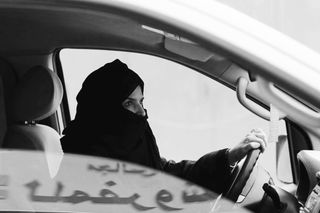
Saudi Arabia Has Unleashed a Spate of Gender Reforms; How Much Should Women Celebrate?
If Saudi women are gaining more rights, does it matter that the reforms seem aimed at boosting the country’s flagging economy and shoring up power for the crown?

Since August, Saudi Arabia has announced a spate of reforms ostensibly aimed at enabling women’s autonomy and loosening the country’s extreme interpretation of Islam. The gender reforms date back nearly a decade, to 2011, when Saudi women gained the right to vote and run in municipal elections and be appointed to the Shura Council, the highest advisory body with the power to propose but not enact laws. But they’ve been coming faster and thicker in recent years, following the ascension of Crown Prince Mohammed bin Salman (widely referred to by the media as MBS) as de facto ruler in 2017. If in 2011, the same year Saudi women were granted limited political rights, a woman was sentenced to 10 lashes for the offense of driving, by 2017, the driving ban was lifted entirely for women.
More recent reforms in 2019 have been aimed at dismantling the country’s deeply patriarchal guardianship system, under which women, regardless of age, lived as lifelong juveniles, subject to the dictates and permissions of male guardians (who, in some cases, could be a teenage son). Since August, women can now apply for a passport (upon age 21) and travel abroad without first obtaining permission from their male guardian; they are also able to register births, marriages, divorces, and to register themselves as a head of household able to act on their minor children’s behalf, alongside a living father. And protections against gender discrimination in the workplace have been expanded, such as protecting pregnant women from indiscriminate firing.
The question is — how much should we trust that these reforms are really aimed at empowering women?
These moves have been lauded as baby steps – and some larger-sized steps – toward reforming a deeply patriarchal system, in which overnight seachange is not possible; “I just want to remind the world that American women had to wait long to get their right to vote. So we need time. We have taken many steps,” MBS, then-Deputy Crown Prince, told Bloomberg in a 2016 interview.
Three years since that interview, progress has undoubtedly been made. But there is a much longer way to go, compared to the distance gained to date: Women still have a male guardian, making them, essentially, second-class citizens in their own country; they still must get the male guardian’s approval to marry, live on their own, or leave a care facility — such as jail, or a domestic violence shelter; they cannot pass on their citizenship to a child, nor provide consent for a child to marry, among many other restrictions. Men can still register criminal cases of disobedience or absence-from-home against women, Reuters reported this year.
“So, all that combined together has created this atmosphere of Saudi really being made to answer questions when it comes to gender inequality,” said BBC gender and identity reporter, Megha Mohan, in a video analysis of the recent reforms.
Related on The Swaddle:
Centre Has ‘Taken Steps’ for Women’s Safety, Minister Says. Are They The Right Ones?
Except it hasn’t. While international media has lauded the reforms, and policy experts are cautiously optimistic, the majority of these steps seem aimed at reviving Saudi Arabia’s flagging economy, and shoring MBS’s personal appeal among his base (youth), than at recognizing the innate equality of women. It’s telling that the recent spate of reforms came after several high-profile cases of Saudi women fleeing the country to escape familial persecution under the guardianship system, such as Rahaf Mohammed Alqunun, who fled to Thailand in 2017 and was later granted sanctuary in Canada, and Dina Ali Lasloom, who sought asylum in Australia in 2017 but was forced to return to Riyadh from the Philippines, en route.
“The growing number of women fleeing the country hindered the modernization efforts and was counterproductive to the Kingdom’s image abroad,” Eman Alhussein, a visiting fellow at the European Council on Foreign Relations, told TIME magazine.
Hence, a policy announcement that enabled Saudi diplomats to countries whose money (and arms) Saudi Arabia sorely needs to tout human rights progress. “This may seem like a small step but it is, nonetheless, transformative for Saudi women,” Prince Khaled bin Bandar, the Saudi ambassador to the U.K., said in a statement, according to Reuters; the new measures show Saudi leadership’s “unequivocal commitment to gender equality,” tweeted Princess Reema bint Bandar, the Saudi ambassador to the U.S. These statements sound better than stories of the women fleeing oppression — and maybe even obscure the fact that the names of the 13 programs under the kingdom’s Vision 2030 plan (largely seen as driven by MBS) make no reference to gender equality or women’s rights.
Maybe each program contains a strong women’s empowerment component; maybe leaving mention of women’s rights out of the broad framework is what flies in a country trying to undo its deeply misogynist laws and social structures. But messaging matters.
Especially when actions belie the progress.
In the period since the country lifted the driving ban, the Saudi government has unleashed a fierce crackdown on political activists who would seek to challenge the status quo further than it deems appropriate. A dozen or more women’s rights activists were arrested before and after the repeal of the driving ban; while some were released later on bail, others, such as Loujain al-Hathloul — widely credited as an integral challenger to the driving ban — are still in prison, where they face torture and sexual abuse, according to Amnesty International.
And of course the most prominent example — the murder of Saudi dissident journalist Jamal Khashoggi in the Saudi embassy in Turkey, for which “a forensic and damning UN report said the crown prince should be investigated … because there was ‘credible evidence’ that he and other senior officials were liable for the killing,” reported The Guardian earlier this year. The crown prince has denied involvement in the killing of Khashoggi.
Some would argue none of this matters if the net result for the majority of women is expanded rights. But it does matter. If Saudi Arabia’s gender reforms really are primarily geared toward an economic boost, or toward shoring up a base, that means it’s likely reforms (gender or otherwise) will only go as far as the economy benefits, or as far as the base feels appeased. Given the previous state of affairs, it may not take much for either.
Finally, in an absolute monarchy, or any other kind of dictatorial regime, any kind of social change is a threat, even when it’s been initiated by the leadership itself. “[Reform is] an art rather than a science, and being an art, there are going to be mistakes. [MBS] can’t let the snowball get too big,” Ali Shihabi, head of the Washington, D.C.-based, pro-Saudi think tank Arabia Foundation, acknowledged to NPR earlier this year.
Other analysts are saying the crackdown on activists is the attempt to manage the size of the snowball, so to speak – to portray these new allowances as royal blessings, not innate human rights, thus shoring up the power of the crown instead of stoking support for further dissent and reform.
“Repression and reform go hand in hand in Saudi. Women activists represent a major threat to [the prince’s] rule, they speak the language of rights,” Madawi al-Rasheed, visiting professor at London School of Economics’ Middle East Centre, told Reuters in August. “The crown prince wants to take all the credit, he is presenting these reforms as a gift to the Saudi citizens, not as their rights.”
While this may prevent widespread political instability, it’s a dangerous message from a reformer, one that may undermine the intent — and certainly the effect. The message from the top matters: patriarchs — those undisputed monarchs-of-the-family — accustomed to being in control of their women will take their cue from the royal tone. Which casts doubt on the extent to which women will actually get to avail of their newfound freedoms. Experts are watching Saudi courts, to see whether their rulings reflect the same spirit of reform and embrace of women’s equality; others are calling for improved reporting channels for when rights are infringed, and the establishment of watchdog organizations.
Because, the thing about gifts? They can be taken back.
Liesl Goecker is The Swaddle's managing editor.
Related


Report: Women Freelancers Face Larger Gender Pay Gap Than Those Employed Full‑Time
